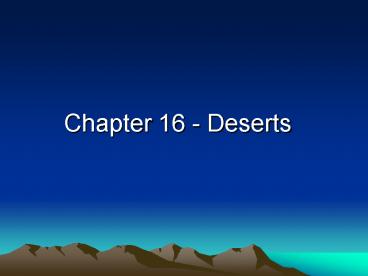Chapter 16 Deserts - PowerPoint PPT Presentation
1 / 54
Title:
Chapter 16 Deserts
Description:
Coastal desert- prevailing onshore wind cooled by cold ocean current ... Little chemical weathering produces manganese and iron-oxide stains, called desert vanish ... – PowerPoint PPT presentation
Number of Views:285
Avg rating:3.0/5.0
Title: Chapter 16 Deserts
1
- Chapter 16 - Deserts
2
Definition of Desert
- A desert is an area with less than
- 25 cm (10 inches) of annual precipitation
- aridity index potential evaporation/precipitatio
n - greater than 4.0
- Deserts may be cold, temperate or hot. All major
continents have one type of desert or the other.
3
Wind-Swept Sand Dunes
Deserts cover about 1/5th of the land About 10
of that is dune covered
4
Desert Life Forms (Roadrunner)
Desert animals are adapted to the scarcity of
water
5
Desert Life Forms (Lizard)
6
Types of Deserts
- Desert Types
- - Subtropical Desert 30o Latitude
- - Deserts on Leeward side of major Mountain
ranges - - Interior Deserts- center of continents far from
ocean - - Coastal desert- prevailing onshore wind cooled
by cold ocean current - - Polar deserts- extremely dry
7
World's Deserts
about 1/5th of land
8
Atmospheric Convection and Subtropical Deserts
Tropopause Barrier
RAIN
9
A Rain-Shadow Desert
10
Ocean-Current Desert
11
Desert Landscape (Features)
- Weathering and desert streams create Desert
features - Weathering in Desert is mostly mechanical
- Little chemical weathering produces manganese and
iron-oxide stains, called desert vanish - Stream Erosion
- Arroyo- channel with water during periods of high
discharge but dry most part of the year - Pediments- large-area gently inclined sediments
- Inselberg- steep-sided knob of durable rock
- Playa- dry lake bed
12
Chemical Weathering in Deserts
Desert Varnish
13
Desert Landforms Produced By Water
14
Uluru (Ayers Rock) Inselberg
15
Playas
16
Playas (cont'd)
17
Playas (cont'd) A Playa in Death Valley,
California
Spadefoot Toad Anecdote
Evaporites 20 mule team Borax
18
Swimmers in hypersaline Dead Sea
Evaporite deposits indicate a dry climate in the
geologic record
19
Water-Carved Canyon
Dangers of Arroyos-Flash Floods
20
Work of Winds
- Erosion by Wind
- Deflation- wind removes finer particles from the
surface - Desert pavement- layer of pebbles left behind
after deflation - Abrasion- sand blasting
- Ventifacts- wind-shaped stones with sharp-edge
faces - Yardangs- streamlined desert ridges
21
Sandstorms
- In dry areas large wind-driven sandstorms, called
black rollers in some areas, can suspend
sand-size particles - These sand-blast anything in their paths
22
Blowout Caused by Deflation
Anecdote How fast does this occur?
23
Desert Pavements
24
Desert Pavements (cont'd)
25
Desert Pavements (cont'd)
26
Desert Pavements (cont'd)
Makes a great runway for supply aircraft Just
clear away a few big rocks We tow makeshift rakes
behind our Land Rovers
Source Martin Miller
27
Desert Pavements (cont'd)
Note desert varnish, lack of sand, Iron Oxide
over everything Infiltration is slow Flash
Floods, and most water leaves the area
28
Remnants of Wind AbrasionIn addition to flash
flood erosion(surfaces are sand blasted)
29
Origin of Ventifacts
30
Origin of Ventifacts (contd)
Henry Bunn, Left Handed Smoke Shifter
Wind
31
Yardangs , White Desert, Egypt
Sphinx?
32
Transport By Wind
- Suspension- most suspended grains consist of dust
(silt, clay, pollen, bacteria, salt crystals from
evaporation, etc. Can be high and travel
thousands of miles. - Bed Load- sediments moved along or near the
ground - Moves by Traction (rolling) or Sliding (rare)
- or saltation (bouncing) - bed loads lifted off
the ground momentarily due to force of collision
with other grains. If windy enough, one starts a
chain reaction
33
Transport of Wind-Borne Sediment
Sahara to Caribbean Effect on Hurricanes
34
Deposition of Dunes
- Reduced wind velocity results in sediments
deposition - Dunes are hills of loose wind-born sand
- Size, shape, and orientation of dune are
determined by available sand, vegetation, and
wind
35
Beach Sand Dunes
Sandy Hook, Island Beach
36
Deposition of Winds Bed Load
Rain Shadow Desert in Lee Of Mountains
37
Large Scale Dunes (Gobi Desert)
Movement vs. small dunes
38
Dune Migration
Just like ripples in a stream
39
Dune Migration (cont'd)
40
Deposition and Dune Types
- Dune Types
- Transverse- ridges that are perpendicular to
prevailing wind direction - Longitudinal- ridges that are parallel to
prevailing wind direction - Barchans- crescent-shaped with horns pointing
downwind - Horseshoe (Parabolic)- crescent-shaped with horns
pointing upwind - Star- winds from three or more directions
41
Transverse Dunes
42
Transverse Dunes
43
Longitudinal Dunes
44
Longitudinal Dunes
45
Barchan Dunes
46
Barchan Dunes in Baja California
47
Parabolic Dunes
Horns pinned by plants
48
Star Dunes
49
Star Dunes
50
Lithified Sand Dunes (Jurassic Navajo Sandstone)
51
Loess from the Columbia River Basin
- Loess deposits are (usually) of glacial outwash
silt. These thin downwind.
52
Desertification
- Desertification- invasion of desert conditions
into formerly non-desert areas - Drought and overpopulation are main causes
- Signs
- Lowering of water table
- Marked reduction of water supply
- Increased salinity in water and soil
- Progressive destruction of native vegetation
- Accelerated soil erosion
- Anecdote the role of goats, Acacia Commifera
removal and evaporation. Past and current
drought. - Death of cattle water dependant foods.
53
Desertification- Map of the Sahel
54
End of Chapter 16































